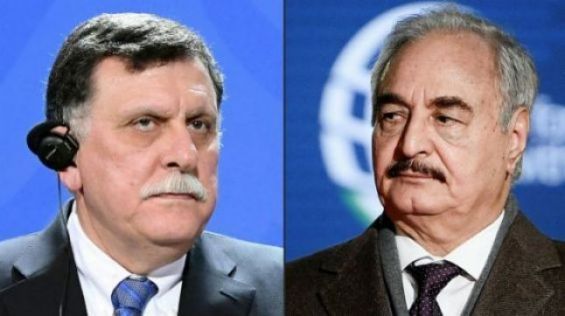While Libya's UN-recognized government is negotiating a ceasefire with the Marshal Khalifa Haftar forces, the Libyan crisis has been at the heart of an intense diplomatic war in the Maghreb.
Wednesday, the Minister of Foreign Affairs, African Cooperation and Moroccans residing abroad, Nasser Bourita flew to Tunis for an audience granted by the Tunisian president, Kaïs Saeïd.
During their meeting, Bourita delivered a royal message on «bilateral relations, the means to further develop them and the situation at the regional and international levels» to the Tunisian president. This visit comes only one day after five high-ranking Algerian officials flew to Nouakchott to meet the Mauritanian president.
On Tuesday, the Algerian delegation, led by Minister of Foreign Affairs Sabri Boukadoum, was received by Mohamed Ould Cheikh Ghazouani. Although the official Mauritanian agency vaguely spoke of the main lines of this meeting, Algerian media reported that a tête-à-tête between Sabri Boukadoum and his Mauritanian counterpart Ismail Ould Cheikh Ahmed focused on the Libyan file.
A race to mediate in the Libyan case
On the same day, Algiers announced its intention to «fulfill its role as mediator» for the resolution of the Libyan crisis and «put an end to the bloodshed». «We were very close to finding a solution to the Libyan crisis, but we were not allowed to do it because, for some, if Algeria manages to resolve the Libyan crisis it would propel it to the forefront of the international scene (…) which they don't want», said president Abdelmadjid Tebboune last week, referring to Morocco, which Algeria considers as its main rival on the matter.
The trip to Tunis for Nasser Bourita, comes mainly after the position expressed by Tunisia against foreign intervention in Libya. Last week, during a telephone interview between Kaïs Saeïd and Emmanuel Macron, the Tunisian president affirmed that the country «upholds the sovereignty of Libya just as much [as it upholds its own]». «Tunisia will not be a rear base for any party», he insisted, adding that his country «remains in favor of a Libyan-Libyan solution without any foreign interference». A position that goes hand in hand with that expressed by Morocco, especially last January.
For the record, Nasser Bourita had a telephone conversation on Sunday with his counterpart of the Government of National Accord, Mohamed Taha Siala, during which he reaffirmed that «the political agreement signed in the Moroccan city of Skhirat is the main benchmark for any political solution in Libya». The statement is meant to respond indirectly to the plan of Egypt, presented Saturday by President Abdel Fattah Al Sissi. Cairo, which supports Marshal Khalifa Haftar, calls for a «ceasefire» as part of a new peace plan.




 chargement...
chargement...












